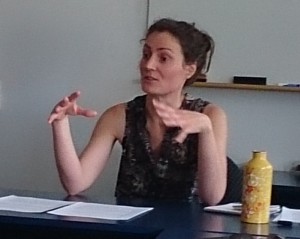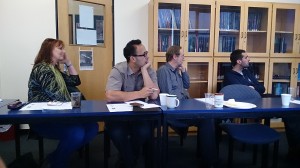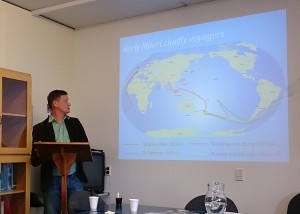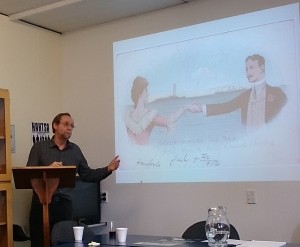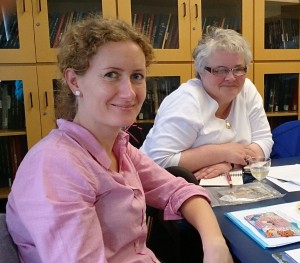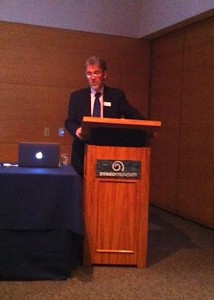New Historical Perspectives on New Zealand and the Sea
This past few days have been a veritable “history week” in Dunedin, providing a diverse and fruitful time for historians with a string of connected events. One, a specifically CROCC workshop – “New Historical Perspectives on New Zealand and the Sea” – discussed below, capped off the week, but CROCC members were present at all events, and were involved in the organisation of most of them.
Things kicked off on Tuesday with the one-day conference of the Religious History Association of Aotearoa New Zealand at the Presbyterian Archive Research Centre (Hewitson Library, Knox College). I heard from John Stenhouse and Hugh Morrison (CROCC members) that this ran really well. On Tuesday CROCC also ran a successful workshop for postgraduate students working on empire and colonialism at St Margaret’s College. Tony Ballantyne and Maya Jasanoff (Harvard University) led discussions with about 15 postgraduates from Otago and other New Zealand universities.
The main event was of course the New Zealand Historical Association’s biennial conference held in the St David Lecture Complex, at the University of Otago, with about 200 attendees enjoying three days of multi-streamed presentations and five brilliant keynote speakers: Maya Jasanoff, Damon Salesa (University of Auckland), Elizabeth Elbourne (McGill University) Atholl Anderson (Australian National University), and Henry Yu (University of British Columbia). It is worth noting that while not an official Centre event, the organising committee (Tony Ballantyne, Angela Wanhalla and Michael Stevens) and NZHA executive (Tom Brooking, John Stenhouse and Barbara Brookes) are all CROCC members. One of the highlights of the conference was the conference dinner (and Atholl Anderson’s keynote address) out at Otākou Marae, on the Otago Peninsula. No doubt, there will soon be much more information on the NZHA conference on the History Department’s Facebook page.
On Saturday the CROCC-sponsored event, New Historical Perspectives on New Zealand and the Sea, organised by Frances Steel (University of Wollongong), was held in the History Department at the University of Otago. It began with Jonathon West offering a short discussion remembering Ian Church who passed away recently. Ian was a well-published local historian with a keen interest in maritime history who was very generous with his time and knowledge with a number of younger historians. Frances then opened the conference proper posing some ideas and questions with relevance to oceanic and maritime histories.
The first speaker was Michael Stevens (University of Otago) who has recently won a prestigious Fast-Start Marsden research grant to look at the “global” aspects of Southland’s coastal port of Bluff. Michael of course discussed Bluff, but in particular explored how the colonial history of Māori might be reframed to incorporate the sea. Jonathan West (Waitangi Tribunal) followed with a talk that investigated what lies beneath the surface of the sea, and how it was the nature of the ocean current currents and the coastal and marine topography that provided such a bounty in the surrounding waters for first Māori, and then for the Pākehā settlers. Alison MacDiarmid (NIWA) then gave a fascinating talk on how humans have affected the marine ecosystems around New Zealand. While some species have disappeared from some areas, there is some good news, with some other species now regenerating. Her research is just part of wider multi-disciplinary research involving scientists as well as archeologists and historians.
After a short break, Susann Liebich (James Cook University) discussed her current research on magazine culture, and how maritime themes and stories appeared in their content of Australian magazines between the wars. Philip Steer (Massey University) followed with an analysis of how a number of recent New Zealand historical novels have incorporated the sea and sea travel within the plot lines. After lunch David Haines (Waitangi Tribunal) took us back to the pre-Treaty days when Māori were active in sea travel, not just to New South Wales, but also as far as London. He sketched out the stories of two voyages by Māori rangatira between Sydney and New Zealand, one to the Bay of Islands, the other from southern New Zealand, illuminating the ways that Māori chiefly status might manifest itself on board these sailing ships. Peter Gilderdale (AUT University) then brought us to the late Victorian and Edwardian colonial period when “Hands Across the Seas” postcards linked New Zealand (and other colonies) to Britain, and sometimes to the USA. These postcards proved particularly popular with migrants, often featuring oceanic steamship travel. Tony Ballantyne gave the last prepared presentation on transport, communication and the flow of ideas, and how the speed and pace of colonial life changed as technologies developed. The afternoon was then brought to an end by two thoughtful responses from Jonathan Scott and Damon Salesa (both University of Auckland) on what they heard, followed by a discussion on how this collaboration might be continued in the future.
The Centre for Research on Colonial Culture congratulates all those involved in the events that ran so successfully this week.
Register for the James Cowan Symposium
The registration portal for the Cultural Go-Between, Colonial Man: New Perspectives on James Cowan Symposium is now open. Click on the highlighted text, which will take you to the portal.
The Cowan Symposium is co-hosted by the Alexander Turnbull Library, and takes place at The National Library in Wellington on 21 February 2014. Keynote speaker is Associate Professor Chris Hilliard, University of Sydney.
Considering Performance in Colonial Culture
A special issue of the Journal of New Zealand Studies on Colonial Performance has just been released. It features essays by a number of the Centre’s members, notably Tom Brooking and John Stenhouse, and the volume was edited by Barbara Brookes. Congratulations to all involved in creating this special issue!
Congratulations to Dr Angela Wanhalla
Great news for CROCC member, Dr Angela Wanhalla, for being awarded a Rutherford Discovery Fellowship to develop her research, “Marriage: The Politics of Private Life in New Zealand”. This award, administered by the NZ Royal Society, is designed to recognise, and help foster the careers of future research leaders. Since its inception in 2010 the RDF has been largely the preserve of scientists, so this is great news not just for Angela, the University of Otago, but also for the Humanities in New Zealand. Congratulations, Angela. Read the initial press release and more details on Angela’s project here
James Cowan Symposium
A reminder that abstracts for the James Cowan Symposium (to be held in early 2014), co-hosted by the Centre for Research on Colonial Culture and the Alexander Turnbull Library, are due by 30 September. More details about the event can be accessed here: Cowan Symposium ePoster
Warm Welcome to Dr. Samia Khatun
The Centre for Research on Colonial Culture is pleased to announce that Dr Samia Khatun will be based in Dunedin from September 2013 to February 2014 as a guest of CRoCC.
Samia completed her PhD at the University of Sydney, where her research examined cultural encounters and translation in the Australian interior using both Aboriginal and South Asian language materials. She has held a postdoctoral fellowship at Zentrum Moderner Orient (ZMO), Berlin and has recently completed a residency at the Asian-American Writers Workshop, New York, USA. Samia is also an accomplished film maker.
While in Dunedin she will be completing her book manuscript Camels, Ships and Trains: Australia in an Indian Ocean Context.
Colonial Origins of NZ Politics and Government
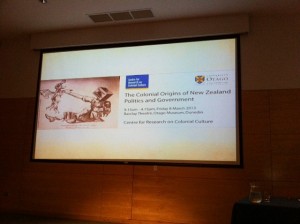 On Friday March 8th, members of the Centre gave presentations on aspects of the colonial origins of New Zealand politics and government. This was our contribution to the “conversation” with the Constitutional Advisory Panel, a body established by the government to canvass public views on the constitution. This was a public event, held at the Otago Museum, and attended by a variety of people throughout the day. Present were two panel members, Peter Chin and Sir Tipene O’Regan, and the panel’s administrative organiser, Lison Harris.
On Friday March 8th, members of the Centre gave presentations on aspects of the colonial origins of New Zealand politics and government. This was our contribution to the “conversation” with the Constitutional Advisory Panel, a body established by the government to canvass public views on the constitution. This was a public event, held at the Otago Museum, and attended by a variety of people throughout the day. Present were two panel members, Peter Chin and Sir Tipene O’Regan, and the panel’s administrative organiser, Lison Harris.
Professor Tony Ballantyne, the Centre director, welcomed those attending, and this was followed by talks on theimpact of religion (Assoc Prof John Stenhouse); the political aspirations of early colonists (Prof Ballantyne); how rangatiratanga was understood in the colonial period (Dr Lachy Paterson); Māori voting patterns (Dr Paerau Warbrick-Anderson); iwi and the state (Dr Michael Stevens); the making of modern politics (Prof Tom Brooking); and the relationship between art and politics (Assoc Prof Mark Stocker). To round off the day, Sir Tipene O’Regan and Prof Erik Olssen offered their thoughts on the day’s events.
Check out more images here on the Department of History and Art History Facebook page.
CRoCC in the news
Tony Ballantyne was interviewed about the Centre for Research on Colonial Culture and our forthcoming Colonial Objects Conference recently. Read the story here.

